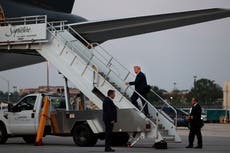Trump claims ‘presidential immunity’ in Jan 6 election subversion case
Lawyers argue that Trump’s attempt to overturn election ‘cannot form the basis of criminal charges’
Donald Trump’s legal team is attempting to have his federal election subversion case dismissed in a Washington DC federal court on the basis of presidential immunity, arguing that all of his actions were within the “outer perimeter” of his work as the top public official in the US.
“The acts alleged in the indictment lie firmly within the ‘outer perimeter’ of the President’s official responsibility. Therefore, they cannot form the basis of criminal charges against President Trump,” the lawyers wrote in the motion to dismiss filed on Thursday.
The former president has pleaded not guilty to four counts in the case brought by the office of Special Counsel Jack Smith, including conspiring to defraud the United States and to obstruct an official proceeding.
Quoting previous cases, the lawyers wrote that “‘In view of the special nature of the President’s constitutional office and functions,’ a current or former President has ‘absolute Presidential immunity from [civil] damages liability for acts within the ‘outer perimeter’ of his official responsibility’”.
“No court has addressed whether such Presidential immunity includes immunity from criminal prosecution for the President’s official act. The question remains a ‘‘serious and unsettled question’ of law,’” the filing stated.
The legal team of Mr Trump argued that the Supreme Court found in a previous case that holding a president liable for his actions in an official capacity would “diver[t] [the President’s] energies” as well as “raise unique risks to the effective functioning of government,” particularly because of “the singular importance of the President’s duties”.
“Chief among these risks is the chilling effect personal liability would have on the President’s decision-making, particularly in ‘matters likely to ‘arouse the most intense feelings,’” they write.
The legal filing stated that it’s in the “greatest public interest” for a public official to have “‘the maximum ability to deal fearlessly and impartially with’ the duties of his office”.
Citing the previous case, the legal filing noted that “although Fitzgerald concerned civil liability, the exact same, if not more elevated, concerns apply to potential criminal prosecutions, mandating the same absolute immunity”.
They argued that the separation of powers shouldn’t allow “local, state, or subsequent federal officials to constrain the President’s exercise of executive judgment through threats of criminal prosecution”.
They claim that this would permit “political opponents to usurp his or her constitutional role” which would impair “our system of government”.
As an extension of this, the filing stated that presidential immunity is “rooted in the separation of powers under the Constitution”.
“To ensure the President may serve unhesitatingly, without fear that his political opponents may one day prosecute him for decisions they dislike, the law provides absolute immunity ‘for acts within the ‘outer perimeter’ of [the President’s] official responsibility,’” the lawyers argue.
The legal team argued that Mr Trump’s “efforts to ensure election integrity” cannot have been outside the bounds of his duties and therefore cannot be subject to criminal action against him. Mr Trump has made and continues to make, baseless claims that the 2020 election was stolen from him by fraud and his “efforts to ensure election integrity” are considered by many observers to in reality have been an unlawful attempt to remain in power.
Law professor and former US Attorney Harry Litman wrote on X that “this I [would] say is the big one that we’ve known would come – Trump moves to dismiss [January 6] case based on immunity”.
“He’ll lose before [Judge Tanya] Chutkan, and probably DC [Circuit] (absent a great panel for him),” he added.
Attorney Robert DeNault wrote that “as Trump begins his third (or fourth? or fifth?) attempt to get SCOTUS to recognize some form of presidential immunity, I’m recalling this paragraph from Trump v. Vance, where SCOTUS rejected his argument a president is immune from state grand jury subpoenas. Seems relevant”.
The paragraph states that “a king is born to power and ‘can do no wrong’. The President, by contrast, is ‘of the people’ and subject to the law”.



Bookmark popover
Removed from bookmarks